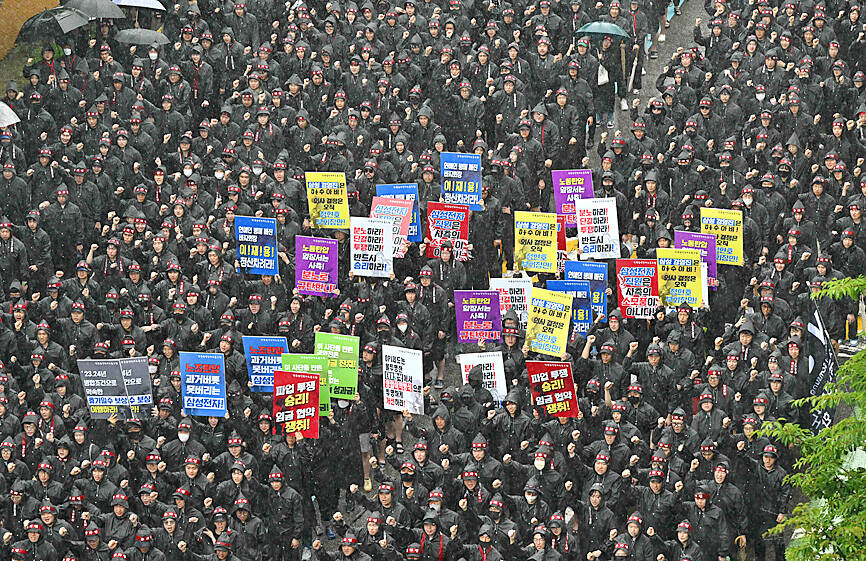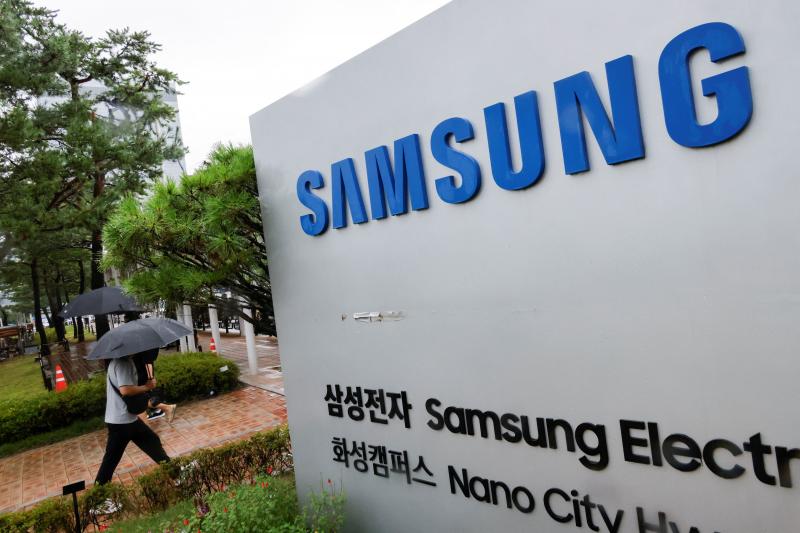Workers at South Korean tech giant Samsung Electronics Co yesterday began a three-day general strike over pay and benefits, the head of a union representing tens of thousands of employees said, adding that the action could affect memorychip production.
Samsung Electronics is the world’s largest memorychip maker and accounts for a significant chunk of global output of the high-end chips.
Wearing rain jackets and ribbons saying “fight with solidarity,” thousands of workers gathered outside the company’s foundry and semiconductor factory in Hwaseong, an hour south of Seoul.

Photo: AFP
Samsung management has been locked in negotiations with the union since January, with the two sides failing to narrow differences on benefits and the union rejecting a 5.1 percent pay raise offer from the firm.
“The strike has started from today,” National Samsung Electronics Union head Son Woo-mok said.
“Today’s general strike is just the beginning,” he added.

Photo: Kim Soo-hyeon, Reuters
“Recalling why we are here, please do not come to work until July 10th and do not receive any business calls,” he told the crowd of workers.
About 5,200 people from factory facility, manufacturing and development had joined the protest, the union said.
The union, which has more than 30,000 members, or more than one-fifth of the company’s total workforce, announced the three-day general strike last week, saying it was a last resort after talks broke down.
The move follows a one-day walkout last month, the first such collective action at the company, which went decades without unionization.
Workers in March rejected the offer of a 5.1 percent pay hike, with the union having previously outlined demands including improvements to annual leave and transparent performance-based bonuses.
“While the ongoing strike is only scheduled for three days, the participating members include those working in chip assembly lines,” Sejong University business professor Kim Dae-jong said. “Given that the union could carry out additional strikes in case the gridlock continues, it could pose a great risk to Samsung management amid its race for dominance in the competitive chips market.”
Samsung’s shares yesterday closed largely unchanged, after saying in a statement that the strike has had no effect on chip output.
The company, the flagship subsidiary of South Korean giant Samsung Group, on Friday posted a 15-fold increase in its second-quarter operating profits, as demand for the advanced chips that power artificial intelligence (AI) systems has skyrocketed thanks to the success of ChatGPT and other generative AI products.
This week, the company is preparing to unveil new foldable phones and watches as well as a smart ring in Paris ahead of the Olympic Games, in an attempt to forestall a challenge from Apple Inc on its global market lead.
“The timing of this strike is particularly critical as it coincides with ongoing semiconductor supply chain challenges,” Mirae Asset Financial Group investment strategist Billy Leung said.
Samsung accounts for about 20 percent of the global DRAM market and about 40 percent of NAND flash, which is used in smartphones and servers.
“Any disruption in Samsung’s operations could have a ripple effect,” Leung said.
Additional reporting by Bloomberg

Taiwanese suppliers to Taiwan Semiconductor Manufacturing Co. (TSMC, 台積電) are expected to follow the contract chipmaker’s step to invest in the US, but their relocation may be seven to eight years away, Minister of Economic Affairs J.W. Kuo (郭智輝) said yesterday. When asked by opposition Chinese Nationalist Party (KMT) Legislator Niu Hsu-ting (牛煦庭) in the legislature about growing concerns that TSMC’s huge investments in the US will prompt its suppliers to follow suit, Kuo said based on the chipmaker’s current limited production volume, it is unlikely to lead its supply chain to go there for now. “Unless TSMC completes its planned six

Intel Corp has named Tasha Chuang (莊蓓瑜) to lead Intel Taiwan in a bid to reinforce relations between the company and its Taiwanese partners. The appointment of Chuang as general manager for Intel Taiwan takes effect on Thursday, the firm said in a statement yesterday. Chuang is to lead her team in Taiwan to pursue product development and sales growth in an effort to reinforce the company’s ties with its partners and clients, Intel said. Chuang was previously in charge of managing Intel’s ties with leading Taiwanese PC brand Asustek Computer Inc (華碩), which included helping Asustek strengthen its global businesses, the company

Power supply and electronic components maker Delta Electronics Inc (台達電) yesterday said second-quarter revenue is expected to surpass the first quarter, which rose 30 percent year-on-year to NT$118.92 billion (US$3.71 billion). Revenue this quarter is likely to grow, as US clients have front-loaded orders ahead of US President Donald Trump’s planned tariffs on Taiwanese goods, Delta chairman Ping Cheng (鄭平) said at an earnings conference in Taipei, referring to the 90-day pause in tariff implementation Trump announced on April 9. While situations in the third and fourth quarters remain unclear, “We will not halt our long-term deployments and do not plan to

TikTok abounds with viral videos accusing prestigious brands of secretly manufacturing luxury goods in China so they can be sold at cut prices. However, while these “revelations” are spurious, behind them lurks a well-oiled machine for selling counterfeit goods that is making the most of the confusion surrounding trade tariffs. Chinese content creators who portray themselves as workers or subcontractors in the luxury goods business claim that Beijing has lifted confidentiality clauses on local subcontractors as a way to respond to the huge hike in customs duties imposed on China by US President Donald Trump. They say this Chinese decision, of which Agence